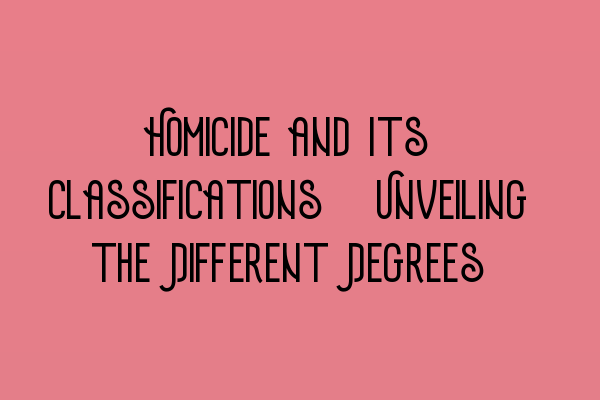Homicide and Its Classifications: Unveiling the Different Degrees
When it comes to criminal law, one of the most serious offenses a person can commit is homicide. Homicide is the unlawful killing of another human being, and it is a complex area of law that requires thorough understanding.
In the United Kingdom, different degrees of homicide exist, each carrying different levels of culpability and potential penalties. In this article, we will delve into the various classifications of homicide to help you better understand their distinctions and implications.
Manslaughter
Manslaughter is a form of unlawful killing that lacks the intent to cause death. It can be further divided into two main categories: voluntary manslaughter and involuntary manslaughter.
Voluntary manslaughter refers to killings that occur under certain circumstances that mitigate the level of culpability. This can include cases where the offender was provoked or acted in self-defense. To explore voluntary manslaughter in more detail, you can read our article on SQE 1 Practice Exam Questions.
Involuntary manslaughter, on the other hand, is when the unlawful killing occurs unintentionally or as a result of recklessness. It often involves a disregard for human life but lacks the premeditated intent found in murder cases. If you want to test your knowledge on involuntary manslaughter, you can check out our SQE 1 Practice Mocks FLK1 FLK2.
Murder
Murder is the most serious classification of homicide and involves the intentional killing of another person with malice aforethought. Malice aforethought refers to the specific intent to cause death or serious bodily harm. Murder convictions carry severe penalties, including life imprisonment.
Within the categorization of murder, there are different degrees based on the level of intent, planning, and circumstances surrounding the killing. These degrees may vary slightly depending on the jurisdiction, but they generally include:
- First-degree murder: This involves premeditation and deliberate planning to commit the homicide. It often includes specific intent to kill or cause serious harm. If you want to learn more about first-degree murder, you can explore our SQE 2 Preparation Courses.
- Second-degree murder: Unlike first-degree murder, second-degree murder does not require premeditation or deliberate planning. It still involves the intentional killing of another person but lacks the additional elements found in first-degree murder. If you need assistance with second-degree murder cases, our SQE 1 Preparation Courses can provide valuable insights.
- Voluntary intoxication: In some cases, voluntary intoxication can be used as a defense to reduce a murder charge to manslaughter. It involves proving that the defendant’s mental capacity was significantly impaired due to voluntary consumption of alcohol or drugs at the time of the killing.
Understanding the different degrees of homicide is crucial when building a criminal defense strategy or prosecuting a case. The classification determines the potential penalties and the elements that need to be proven in court.
If you are an aspiring criminal lawyer or studying for the SQE exams, having a solid grasp of homicide and its classifications is essential. With our comprehensive SRA SQE Exam Dates, you can stay updated on the latest examination schedules and plan your studies accordingly.
Stay tuned for more informative articles on criminal law and practice, as well as valuable resources to help you succeed in your legal career.
